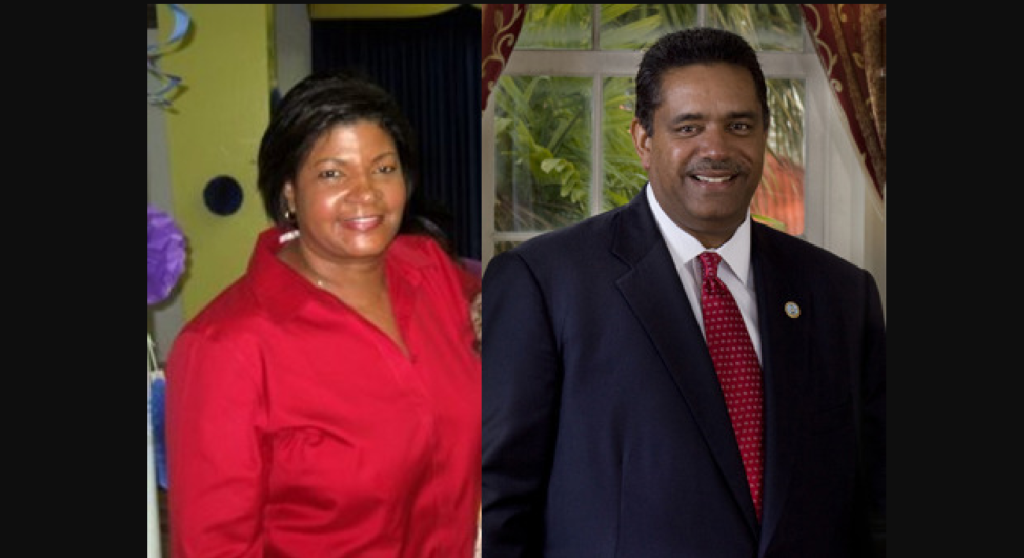The largest bank in the U.S. made the accusations in a filing as part of its defense in a civil suit brought by the territory last year.
NEW YORK — The nation’s largest bank says the wife of a former governor of the U.S. Virgin Islands aided convicted sex offender Jeffrey Epstein’s alleged criminal activity by helping him dodge sex offender monitoring laws, as well as coordinate visas, employment, and travel for his victims.
Cecile Galiber de Jongh was Epstein’s “primary conduit for spreading money and influence throughout the USVI government,” JPMorgan Chase alleged in a court document filed Thursday in the U.S. District Court for the Southern District of New York.
Her husband, John de Jongh, served as governor of the U.S. territory in the Caribbean from 2007 to 2015.
“For two decades, Epstein maintained a quid pro quo relationship with USVI’s highest ranking officials,” the financial institution said in the court document. “He gave them money, advice, influence, and favors. In exchange, they shielded and even rewarded him.”
JPMorgan Chase made the allegations in a filing as part of its defense in a civil suit brought by the territory against it last year. In its complaint, the Virgin Islands alleged the bank “was indispensable to the operation and concealment of the Epstein trafficking enterprise.”
The suit seeks monetary damages. The bank has denied liability.
In a statement, a spokesperson for the islands’ attorney general said, “JPMorgan Chase facilitated Jeffrey Epstein’s abuse, and should be held accountable for violating the law.” The spokesperson called the allegations against Cecile Galiber de Jongh “an obvious attempt to shift blame away from JPMorgan Chase, which had a legal responsibility to report the evidence in its possession of Epstein’s human trafficking, and failed to do so.”
Cecile Galiber de Jongh did not immediately respond to a request for comment.
Epstein was convicted in 2008 of procuring a child for prostitution. He later died by suicide in 2019 at a Manhattan correctional center, where he was being held on federal sex trafficking charges.
Epstein owned a small island in the Virgin Islands. Despite Cecile Galiber de Jongh’s public role and official duties, she managed Epstein’s Virgin Islands-based companies from 2007 to 2015, earning $200,000 in 2007 alone, the court document alleged. Epstein also paid her children’s tuition, according to the document.
The financial institution alleged that she helped Epstein get student visas for three of his victims and assisted in enrolling them in a “bespoke class” at the University of the Virgin Islands (UVI). The class was created to “provide cover for their presence in the territory — the same year Epstein donated $20,000 to the university through one of his companies,” according to the court document.
The victims had to show their ability to pay for the class through a letter, and “perhaps cognizant of the risk in having a registered sex offender sign the letter,” Cecile Galiber de Jongh suggested that someone else sign the letters, the filings said.
Some of the young women Epstein brought to the island also needed employment, including a woman who was seeking a dental license, the court document said. Cecile Galiber de Jongh contacted several government officials about dental licensure rules and regulations, and “ultimately, First Lady de Jongh was successful.”
“The young woman eventually set up a local dental practice in the USVI and shared an office with Epstein’s companies” the bank alleged.
Epstein frequently met with leadership at the Virgin Islands Port Authority (VIPA), which ran the airport on St. Thomas that victims used to get to the islands. Epstein also leased hangar space at the airport.
According to the court document, Cecile Galiber de Jongh asked Epstein — on her husband’s behalf — “if we would support” a local legislator’s bid to return to a position with the Port Authority, adding the legislator would be “’good person for us’ there.”
“Based on his government connections, when traveling through the USVI’s airport accompanied by young women as a registered sex offender, Epstein could count on his ‘great relationship’ with the officials there to avoid scrutiny or detection,” the court document said.
In 2011, the the islands’ legislature took up a bill that would update its sex offender monitoring laws. At the time, according to the filing, Cecile Galiber de Jongh emailed Epstein draft language for the proposed bill, writing “this is the suggested language; will it work for you?”
Epstein objected to several provisions, including one that would require him, as a past offender, to report short trips outside U.S. territory, like to the neighboring British Virgin Islands. He suggested a change: “We should add out of country for more than seven days, otherwise I could not go for a day trip to Tortola, at the last minute.”
The bank alleged that Epstein was “disappointed by the final form of the bill,” but Cecile de Jongh told him that “all is not lost and we will figure something out by coming up with a game plan to get around these obstacles.”
“In sum, in exchange for Epstein’s cash and gifts, USVI made life easy for him. The government mitigated any burdens from his sex offender status,” the court document alleged.
JPMorgan Chase CEO Jamie Dimon is scheduled to be deposed in the Virgin Islands’ lawsuit and a second filed by a Jane Doe against the bank over its alleged Epstein ties.
A JPMorgan spokesman told NBC News last week, “Jamie Dimon never met Epstein, never communicated with him, never emailed with him, and never played a role in any business with him.”
By CHLOE ATKINS/NBC News
Chloe Atkins reports for the NBC News Investigative Unit, based in New York. She frequently covers crime and courts, as well as the intersection of reproductive health, politics and policy.

